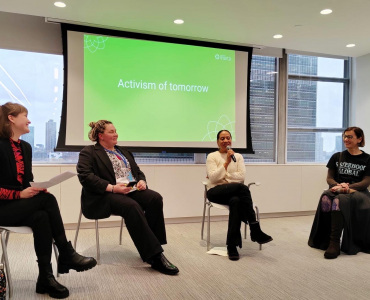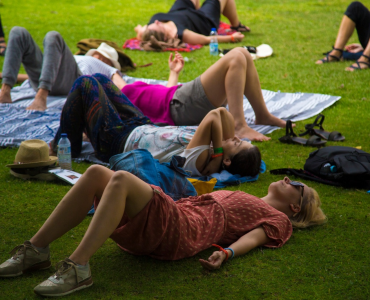The “Gold Chain” of Uzbekistan. Will it link with Latvia?
Filled with hope, curiosity and slight excitement, Latvian MARTA representatives – me myself, Iluta, the chairwoman of Centre MARTA, Dita, the coordinator for the European Commission project for extension of women support centres in Uzbekistan, as well as Lolita, MARTA’s hotline operator, left for Uzbekistan on the evening of April 27. The main objective of the journey was to verify the functioning of women support centres which were opened within the project funded by the European Commission. We knew we were going to a far away country of a completely different culture, so we were ready for some surprises and adventures.
Uzbekistan truly is a country that fascinates; a jewel that gleams in unseen colours each time anew. It is a country, which hosted the famous Silk Road. The cities merge the historic, being thousands of years old, with the modern times. The people have preserved centuries’ old knowledge on cooking, embroidery and xylography, still living up to the old traditions. It is a place that once provided home and workplace to excellent philosophers, poets and scientists, e.g. astronomer Ulugh Beg. Yet, it is a place that is also open to the challenges and topicalities of the 21st century. It is a country that honours Islam, nevertheless maintains the unique “pagan” customs (just like Christianity in Latvia!) and doesn’t turn it into an excuse for intolerance against the different.
We came to see the progress of the project on extending the network of women help desks in Ferghana, Andijan and Tashkent, funded by the European Commission and supervised by FORMAPER — the Italian Chamber of Commerce, Industry, Craft and Agriculture —, the Italian women lobby LEF Italia, MARTA and the support centre for civic initiatives in Latvia, yet we were carried away by a whirl of various events. On April 28th, the annual beneficence concert “In the Name of Life” took place, the aim of which was to raise funds for prevention of breast cancer and provision of access to early diagnostics and timely treatment for women. The patroness of the event was Gulnara Karimova, daughter of the Uzbekistan president. Indeed, I know no other country in Europe where teenagers passionately buy T-shirts, supporting a campaign for prevention of breast cancer and striving to go to an event dedicated to the prevention of the diagnosis. As far as my eyes could see the huge bandstand was packed with teenagers and young people.
In Uzbekistan, just like in Latvia and other places of the world, the life of women is more difficult and challenging than that of men, yet there is the political will to address the situation. With the support of the president a Women committee has been established with regional bodies all around Uzbekistan. Women can approach these bodies with their hard-luck stories. In order to truly strengthen this assistance work, a project for the establishment of women support centres was launched in 2009 with the support of the European Commission. MARTA educated lawyers, psychologists, staff of the mahali (the local self-government systems), as well as other non-governmental organizations to ensure that women are able to get professional and coordinated assistance in various complex situations. The project included opening of support centres in Tashkent, Kokand and Navoiy. Assistance was provided to several thousands of women. Furthermore, the project was implemented simultaneously with a state initiative encouraging people to start their small businesses, including activities that can be carried out at home, e.g., embroidery, pie baking, carpet weaving and making of musical instruments. The success of the first project helped to gain support for the next project. The spectrum of the activities was broadened and centres were opened in Fergana and Andijan as well, i.e., in places with prevailing strong patriarchal traditions which sometimes contradict the state policy. In rural areas it is customary to marry off girls that have just finished elementary school. They are expected to be excellent housewives at their husband’s house and totally submissive to the mother-in-law. Nowadays girls frequently dare to approach the women committee and go to the newly established support centres. By convincing their parents, the marriage is successfully put off and the girls are allowed to complete their education first. Some women have even divorced their husbands, who take influential positions; therefore, just like women in Latvia, they, too, are reasonably concerned of not being able to obtain appropriate allowances from their ex-husbands. Owing to our common projects, there are some positive stories to be told in Uzbekistan as well; thanks to the work of the support centres, substantial allowances for children needs have been gained, regardless of the influential position of the husband. There have been cases when families on the verge of separating get back together, because the woman has had an opportunity for self-realisation — e.g., has opened a sewing or baking workshop and started gaining income to tackle the needs of the family. There have been quite many cases like these in Kokand. Frequently young women that have been assisted by the support centres, share their newly gained knowledge with others — e.g. in youth groups that discuss various issues. Many women, who have once received support, engage themselves in voluntary work afterwards. Women that have started their businesses help the centres with products or other resources and invite other women to participate in the “Gold Chain”.
On May 4th and 5th Gulnara Karimova and the youth organization “Foundation Forum” organized a cultural traditions event “Asral Sadosi” (“The Breath of Centuries”) for the seventh year in a row already; this year we were lucky to participate as well. The event lets one get acquainted with the diversity of Uzbekistan, taste pilaf which is made differently in each place of the country, just like samsas, scones or other titbits; the event offers a possibility to buy wonderful embroideries decorated with traditional ornaments and made in ancient methods, as well as carpets, blankets, clothes, and bags; one can even get a chance to sit in a yurt for a while. The passionate Uzbek dances — filled with underlying messages with each movement and gesture having its own meaning — are worth particular attention. This year Asral Sadosi was organized in the desert near Navoiy, which required watching out of snake caves, in order not to step on the desert life. Although the scenery — the desert and the mountains — is different as that of Latvia, the Uzbek wish to maintain their culture, as well as their pride in their identity made me see many parallels with Latvia. It has to be acknowledged that not only we can help the Uzbek people with our experience, but even learn a lot from them. The communication with the locals has something imperceptible in it, which strengthens the wish to cooperate and establish a joint “Gold Chain” with Latvia.


